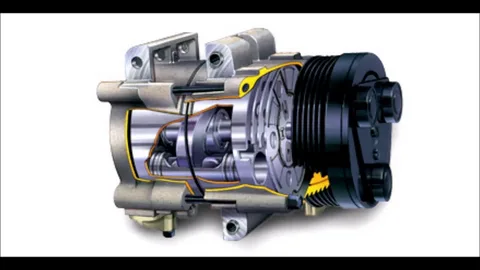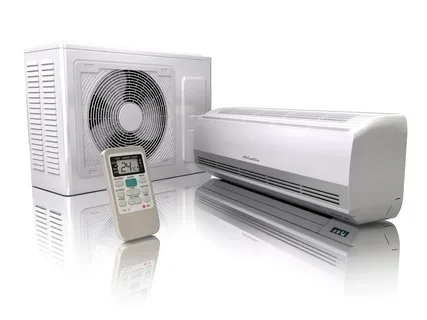If you own a Mitsubishi Aircon Compressor, it’s important to maintain it to ensure it runs efficiently and effectively. Regular maintenance can help prevent issues and prolong the lifespan of your air conditioner. This blog post will provide some maintenance tips for your Mitsubishi Compressor to keep it running smoothly. Let’s start with some basic yet effective measures you can take to ensure its optimum performance. Following these suggestions will save you from costly repairs and frequent replacements in the long run.
Understanding Your Mitsubishi Outlander Air Conditioner Compressor
The Air Conditioner Compressor is an essential component of your vehicle’s HVAC (Heating, Ventilation, and Air Conditioning) system, functioning as the heart of the air conditioning system. This critical piece compresses the refrigerant and circulates it through the system to cool the cabin air. Its operation is powered by the car’s engine via a drive belt, engaging and disengaging as needed to maintain the desired temperature inside your vehicle.
Understanding the mechanics behind your Mitsubishi Outlander air conditioner compressor starts with recognizing its role in refrigerant cycling. When the compressor activates, it takes in low-pressure refrigerant gas from the evaporator. The compressor then compresses this gas into a high-pressure, high-temperature state, which is then sent to the condenser. Here, the heat absorbed from the cabin is expelled to the outside air, and the refrigerant cools and condenses into a liquid. This liquid refrigerant travels back towards the evaporator, absorbing heat from the interior and continuing the cycle.
The efficiency of this process heavily depends on the health and functionality of the compressor. Issues like leaks, electrical faults, or mechanical failure can disrupt the cycle, leading to poor cooling performance or complete system failure. Additionally, the compressor relies on a clutch and pulley system for engagement with the engine’s power. If these components wear out or fail, the compressor cannot operate, halting the air conditioning process.
Common Issues with Your Mitsubishi Compressor
Owners of Mitsubishi Compressors may occasionally encounter a few common problems that can affect the performance and efficiency of their air conditioning system. Identifying these helps prevent prolonged downtime and costly repairs.
One prevalent issue is refrigerant leaks. These leaks can occur for various reasons, such as loose connections, corrosion, or damage to the refrigerant lines. A telltale sign of a refrigerant leak includes a noticeable decrease in cooling efficiency or hissing noise from the air conditioning unit. Refrigerant is crucial for the cooling process, and any leaks can impede the system’s ability to cool the air effectively.
Electrical problems are another concern that can impact your Mitsubishi compressor. Faulty wiring, bad capacitors, or a malfunctioning control board can lead to intermittent or complete air conditioning system failure. These issues might manifest through symptoms like the aircon unit not turning on or turning on and off frequently without adequately cooling the space.
Lastly, compressor failure is a serious occurrence of neglecting early signs of trouble, such as unusual noises or excessive vibration during operation. The compressor is the heart of the air conditioning system, and its failure often means a significant repair or replacement is necessary. Causes of compressor failure can range from overuse and insufficient refrigerant to lack of maintenance.
Troubleshooting Common Mitsubishi Lancer Air Conditioner Compressor Issues
Maintaining a cool and comfortable cabin is crucial, especially during hot summer days. However, if you’re experiencing problems with your Mitsubishi Lancer’s air conditioner compressor, it can quickly turn your drive into a sweltering ordeal. Here are some common issues and troubleshooting steps to help you get your Mitsubishi Lancer Air Conditioner Compressor back in working order.
1. Weak Airflow
If you notice weak airflow from your Lancer’s vents, the compressor may not function optimally. Check the compressor clutch to ensure it’s engaging properly when the AC is turned on. If the clutch isn’t engaging, it may need to be replaced. Additionally, inspect the compressor’s drive belt for wear and tension. A worn or loose belt can impede the compressor’s operation.
2. Warm Air
If your AC is blowing warm air instead of cold, several potential culprits could exist. Start by checking the refrigerant level in the system. Low refrigerant levels can prevent the compressor from effectively cooling the air. If the refrigerant level is adequate, inspect the compressor for leaks. Leaks can occur at various points in the system and may require professional repair.
3. Strange Noises
Unusual noises coming from the compressor can indicate underlying issues. Grinding, squealing, or rattling noises may suggest worn bearings, a loose clutch, or other mechanical problems. Inspect the compressor and associated components for signs of damage or wear. Depending on the severity of the issue, repairs may range from tightening bolts to replacing the compressor entirely.
4. Compressor Cycling
If your compressor frequently cycles on and off, it could indicate an electrical issue. Check the electrical connections to the compressor for any signs of corrosion or damage. Additionally, the pressure sensors and switches in the AC system may need to be inspected and calibrated.
Tips for Maintaining Your Mitsubishi Compressor
Ensuring the longevity and efficiency of your Mitsubishi Compressor involves a proactive approach to maintenance. Here are several key strategies to consider:
Scheduled Inspections:
Establish a regular schedule for inspecting your aircon system. This involves checking the compressor for signs of wear and tear, listening for unusual noises, and looking for any leaks in the refrigerant lines. Early detection of these issues can prevent them from escalating into bigger problems.
Clean or Replace Air Filters:
Dirty air filters can restrict airflow, causing your compressor to work harder than necessary, leading to overheating and decreased efficiency. Cleaning or replacing air filters every few months, or as the manufacturer recommends, can help maintain optimal performance.
Coil Cleaning:
The compressor’s coils are crucial for its operation. Over time, these coils can accumulate dirt and debris, insulating them and reducing their ability to absorb heat effectively. Cleaning the coils regularly ensures that your compressor operates efficiently.
Ensure Adequate Refrigerant Level:
The refrigerant is the lifeblood of your air conditioning system. Too much or too little can cause your compressor to run inefficiently. Periodically check the refrigerant level and have it refilled or adjusted by a professional if necessary.
Lubrication:
Moving parts within the compressor require regular lubrication to prevent friction and wear. Consult your user manual or a professional to determine your specific model’s correct lubrication schedule and products.
Cleaning Your Air Conditioner Compressor Mitsubishi Lancer
Your air conditioner compressor is crucial in keeping your car cool and comfortable during hot weather. Regular maintenance of this component is essential to ensure optimal performance and longevity. One of the key maintenance tasks is cleaning the air conditioner compressor, which helps prevent issues such as reduced cooling efficiency and potential damage to the system. Below is a step-by-step guide on how to clean your Air Conditioner Compressor Mitsubishi Lancer effectively.
1. Gather Necessary Supplies:
Before you begin, gather all the supplies you’ll need to clean the air conditioner compressor. This may include a soft brush, compressed air, a vacuum cleaner with a brush attachment, mild detergent, water, and a clean cloth.
2. Turn Off the Car:
Ensure your Mitsubishi Lancer is turned off and the engine is excellent before cleaning the air conditioner compressor. This will prevent any accidents or injuries during the cleaning process.
3. Locate the Air Conditioner Compressor:
The air conditioner compressor is typically located at the front of the engine compartment. It resembles a metal box with hoses attached to it. Once you’ve located it, carefully inspect the compressor for any visible dirt, debris, or buildup.
4. Clean the Exterior:
Use a soft brush or compressed air to remove any loose dirt or debris from the exterior of the compressor. Be gentle to avoid damaging any components.
5. Clean the Fins:
Carefully clean the fins of the compressor using a vacuum cleaner with a brush attachment or compressed air. Remove any dirt, leaves, or debris trapped between the fins.
Optimizing Your Mitsubishi Compressor Performance
Maximizing the efficiency and performance of your Mitsubishi Compressor is achievable with a few strategic enhancements to your overall cooling system. Integrating a programmable thermostat into your setup offers the advantage of customizing cooling schedules based on your presence and preferences, significantly reducing unnecessary operation times and energy consumption. This smart control can substantially save energy bills and reduce the strain on your compressor by ensuring it operates only when needed.
Another critical aspect to consider is the integrity of your ductwork. Duct leaks can lead to loss of cooled air, forcing your compressor to work harder to maintain the desired temperature. Sealing any leaks and ensuring that your ducts are properly insulated can dramatically improve the efficiency of your air conditioning system. This not only preserves the lifespan of your compressor but also enhances the overall cooling performance.
Taking these measures to optimize your cooling system promotes energy efficiency and contributes to a more sustainable and cost-effective operation. Regular checks for duct leakage and proper insulation, coupled with the smart functionality of a programmable thermostat, ensure that your Mitsubishi Compressor operates at its best, providing optimal cooling without overburdening the system.
Aside from these strategies, using energy-efficient windows and regular system servicing can further enhance your compressor’s longevity and functionality. Stay on top of these proactive measures to ensure your Mitsubishi compressor consistently performs at peak efficiency.
Conclusion
Ensuring your Mitsubishi Aircon Compressor remains in prime condition is not just about immediate benefits, such as consistent cooling and comfort. It’s an investment in the longevity and efficiency of your system. The guidance provided in this blog post, from recognizing early signs of potential issues to implementing regular maintenance routines, is designed to empower you with the knowledge to take proactive steps. This approach minimizes the risk of unexpected breakdowns and contributes to the overall health of your air conditioning unit.
FAQS
Q: How often should I inspect my Mitsubishi Compressor for maintenance?
A: Regular inspections are recommended at least once a year. However, checking the system before the onset of extreme seasons, such as summer and winter, can be beneficial for optimal performance.
Q: Can I refill the refrigerant in my Mitsubishi Compressor myself?
A: While a knowledgeable individual can refill the refrigerant, having a professional perform this task is generally advised. This ensures the correct type and amount of refrigerant is used, and it allows for a comprehensive system check to identify any leaks or other issues.
Q: What signs indicate my Mitsubishi Aircon Compressor needs repair or replacement?
A: Key indicators include unusual noises (grinding, squealing), weak airflow from vents, warm air instead of cool air being emitted, and frequent cycling on and off of the Mitsubishi Aircon Compressor. If you notice any of these signs, consult a professional for a detailed diagnosis.
Q: Is it necessary to clean the air filters even if my Mitsubishi Compressor seems to be working fine?
A: Yes, cleaning or replacing air filters regularly is crucial for maintaining the efficiency of your aircon system. Dirty filters can restrict airflow and force the compressor to work harder, leading to increased wear and potentially higher energy costs.
Q: How does a dirty compressor affect the performance of my Mitsubishi Aircon system?
A: A dirty compressor can reduce cooling efficiency because it struggles to release heat effectively. This can cause the system to consume more energy and potentially overheat, leading to more serious mechanical issues. Regular cleaning of the compressor and its surrounding components is essential for optimal performance.
| Other Good Articles to Read |
| Blogs Rain |
| Cme Blog Spot |
| Garcias Blogs |
| Yyc Blogs |
| Guiade Blogs |
| Blogs-Hunt |
| Impact-Blog |
| Smarty Blogs |
| Ed Blog |
| Mo Blogs |
| Blogs Em |
| Blogs T |
| Related Business Listings |
| Contact Directory |
| Local Business Profiles |



